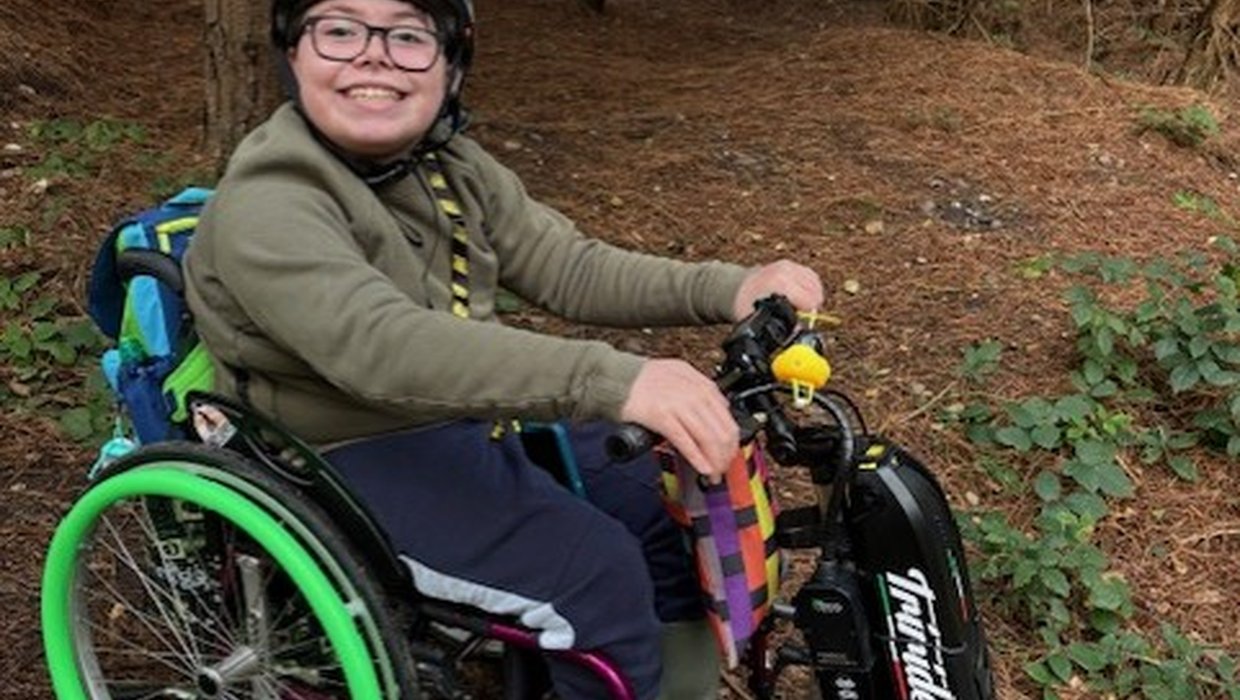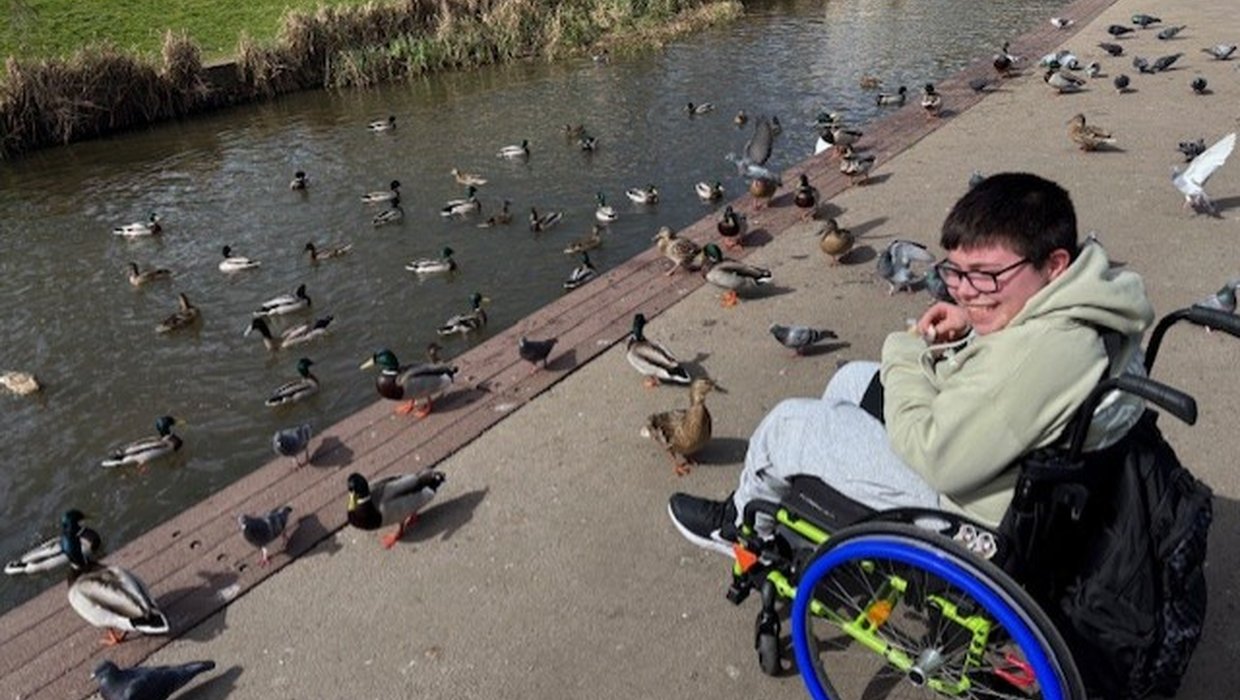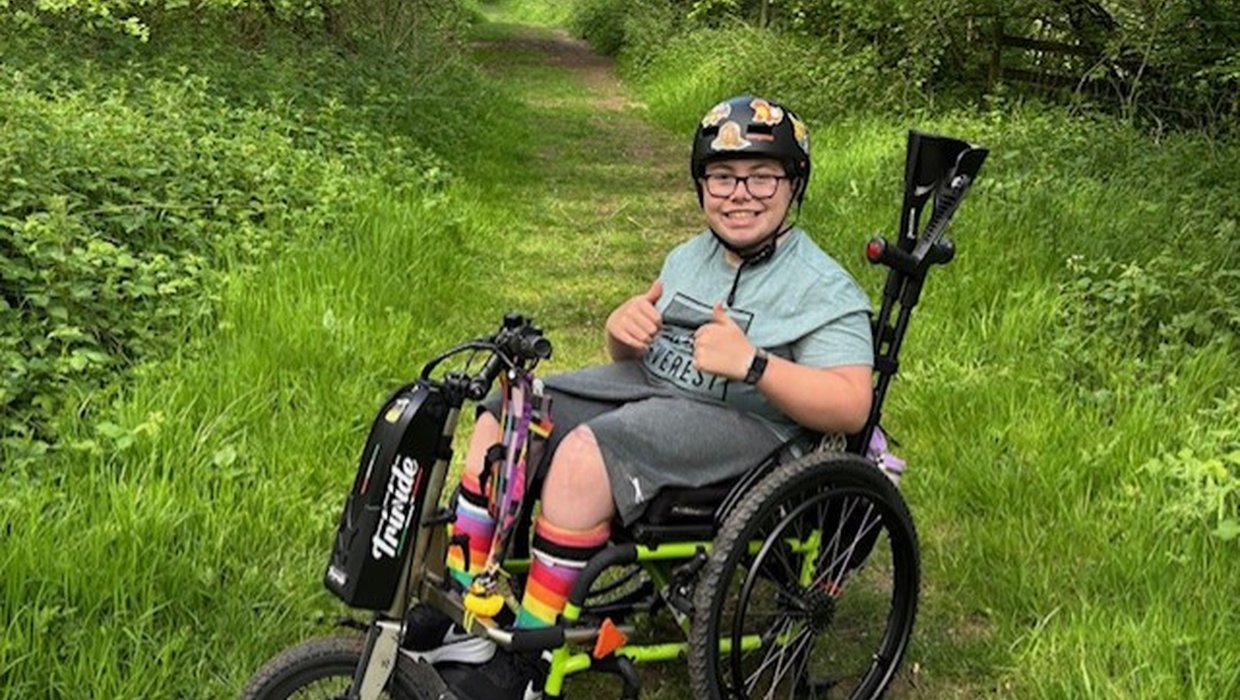Opening the Outdoors
12 year old Ollie discussing accessing the countryside as a young wheelchair user
At just 12 years old, Ollie is adventurous, creative, and always smiling. He finds joy in the natural world—whether he’s in the woods, by a pond, or watching ducks swim by.
“I love to see all the different insects and animals on my adventures. It makes me happy.”
Ollie uses a Tri-Ride—a powered attachment for his wheelchair—which gives him the independence to get out into nature. But even with the right equipment and a strong sense of determination, many parts of the countryside remain difficult or even impossible for him to explore.


The Barriers to Nature
“I’d love to be able to explore more of the countryside independently. It would give me lots more freedom and make me very happy.”
Ollie faces a number of barriers when trying to enjoy the outdoors:
- Overgrown paths that block his way
- Gravel and sharp stones that have punctured his tyres—three times!
- Steep slopes that are too difficult to manage, even with his Tri-Ride
- Uneven and narrow paths that limit where he can go
“Some of the paths are made up of sharp rocks which gave me three punctures in my tyre. That made me have to stop my adventure early.”
Where Things Are Working
There are some spaces Ollie really enjoys—places that have made the effort to be inclusive and accessible.
“The play park at Chasewater is very accessible. It has a wheelchair seesaw with space for two wheelchairs, larger swing seats, and a ramp to access the activity boards. They even have communication boards.”
“The walk from the car park to the play park is accessible too. But the walk around the lake has parts where the average wheelchair would struggle. I use my off-roading wheelchair with big tyres and chunky front wheels, and my mum helps push me.”
Ollie also loves The Wolseley Centre, where the boardwalk around the pond is fully wheelchair accessible. But not all of the site is equally inclusive.
“There’s another path by the river, but it’s not very wheelchair accessible. There’s lots of wildlife to see there, but I can’t always get to it.”


The Power of a RADAR Key
For Ollie, small changes can make a huge difference. One of those is the RADAR key—a tool that lets him unlock gates and access points in public areas.
A RADAR key is a universal access key used across the UK to unlock disabled-friendly facilities, including accessible toilets and gates in public spaces like parks, countryside trails, and nature reserves. Part of the National Key Scheme, it ensures that these spaces remain secure and available for disabled people who need them. The key provides greater independence and ease of access for wheelchair users and others with mobility or hidden disabilities, allowing them to use essential facilities without needing assistance or staff support.
“Using my RADAR key on my local walk has made a big difference. I no longer have to try and squish round the gate into the woods. I can open the gate wide and go easily through. It gives me more independence and lets me access more places than just the concrete path.”
But even then, some issues remain.
“On my walk, a small section of path is made of bigger stones. I have to go really slowly and carefully to avoid another puncture.”
Why It Matters
For Ollie, nature isn’t just a place to visit—it’s essential to his wellbeing, confidence, and happiness.
“Being on my adventures makes me very happy and relaxed.”
But right now, he doesn’t feel included in how many outdoor spaces are designed and maintained.
“No, I don’t feel included. There’s only a limited amount of wheelchair accessible places available. A lot of the outdoor walks I would like to explore where my friends go—I can’t access. Because of uneven or overgrown paths.”


Ollie’s Vision for an Inclusive Outdoors
Ollie has clear ideas for how countryside spaces could be improved so more wheelchair users can explore the outdoors:
“I would like to see more wider and flatter paths that go off the concrete path so wheelchair users can also explore through the trees.”
“More RADAR key gates to allow more access. More picnic benches with spaces for wheelchairs.”
His advice for others like him?
“Always take a puncture repair kit! And research the accessibility of where you’re going.”
And for landowners and countryside managers?
“Accessibility matters in the countryside because wheelchair users also love the outdoors and exploring.”
Everyone Deserves Adventure
Ollie’s experiences highlight how much the countryside means to disabled young people—and how small, thoughtful changes can open the outdoors to everyone.
Nature belongs to all of us. Let’s make sure everyone can explore it with confidence, safety, and joy.
Ollie’s experience is a reminder that improving countryside access isn’t just a nice-to-have—it’s a necessity for equity and inclusion. By making thoughtful design choices and maintaining trails with access in mind, we can open up nature to more people like Ollie who simply want to enjoy the outdoors like anyone else.
Accessible countryside isn't just about mobility—it's about freedom, wellbeing, and belonging. Let's build a countryside where everyone can find adventure.


